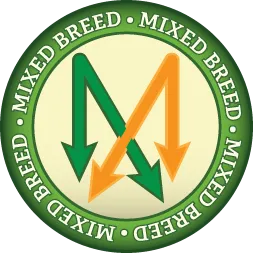Thinking about bringing a Miniature German Shepherd puppy into your life? These adorable, intelligent dogs are a popular choice, and for good reason. But before you start searching for “Miniature German Shepherd Puppies For Sale,” it’s crucial to understand what you’re getting into. This guide covers everything from their temperament and care needs to potential health concerns, helping you decide if a Mini GSD is the right fit for your family.
 Miniature German Shepherd Mix Puppy
Miniature German Shepherd Mix Puppy
Miniature German Shepherds are a mixed breed, typically created by crossing a German Shepherd with a smaller breed like a Miniature Poodle, Border Collie, or even a Yorkshire Terrier. This results in a dog that resembles a smaller version of the iconic German Shepherd, but with its own unique characteristics.
Understanding the Miniature German Shepherd Temperament
Miniature German Shepherds are known for their intelligence, energy, and loyalty. They bond strongly with their families and are generally affectionate, making them excellent companions.
- Family Dogs: Mini German Shepherds often make great family dogs, enjoying playtime with children and generally getting along well with other dogs in the household.
- Prey Drive: They possess a high prey drive, which means they might be inclined to chase smaller animals. Early socialization and training are essential if you have smaller pets.
- Protective and Alert: Expect your Mini GSD to be alert and protective, often barking to alert you to strangers. Socialization and training can help manage excessive barking and encourage a more welcoming attitude towards new people after proper introductions.
 German Shepherd puppy sitting in grass
German Shepherd puppy sitting in grass
Miniature German Shepherds are known for their loyalty and trainability. This picture shows German Shepherd puppies sitting in grass.
Adaptability and Living Environment
Miniature German Shepherds are adaptable dogs but thrive in environments that cater to their energy levels and need for mental stimulation.
- Ideal Home: While they can adapt to apartment living, homes with fenced yards are preferable, offering ample space for running and playing.
- Climate: They tolerate most climates but are sensitive to heat. Ensure they have access to shade and water during warmer months.
- Companionship: They thrive on companionship and dislike being left alone for extended periods. Boredom can lead to destructive behaviors.
Health Considerations for Miniature German Shepherd Puppies
Mixed-breed dogs often benefit from increased genetic diversity, potentially reducing the risk of certain hereditary conditions. However, it’s not a guarantee. When searching for “miniature german shepherd puppies for sale,” prioritize reputable breeders who prioritize health testing.
- Potential Health Issues: Be aware of potential health conditions such as progressive retinal atrophy, hypothyroidism, epilepsy, and hip dysplasia.
- Bloat: Due to their build, they are susceptible to bloat, a life-threatening condition. Learn to recognize the symptoms and take preventative measures.
- Importance of Reputable Breeders: Reputable breeders screen their dogs for genetic issues, increasing the likelihood of healthy puppies. Ask about the health history of both parents and any health tests performed.
Miniature German Shepherd Puppies and Owner Experience
While intelligent and eager to please, Miniature German Shepherds can be challenging for novice dog owners due to their energy levels, working dog instincts, and need for structured training.
- Training is Key: Puppy training classes are highly recommended, especially for first-time dog owners.
- Socialization is Crucial: Socialization is equally important, exposing your puppy to various people, places, and situations to develop into a well-adjusted adult dog.
Grooming Needs
Grooming requirements vary depending on the coat type inherited from the parent breeds.
- Coat Type: Most Mini German Shepherds have a coat that sheds moderately year-round, with heavier shedding during seasonal changes. Regular brushing (a few times a week, daily during shedding season) and occasional baths are typically sufficient.
- Poodle Mixes: If your puppy has a Mini Poodle parent, they might inherit a low-shedding coat, requiring daily brushing and professional grooming every 4-6 weeks.
- Other Grooming: Don’t forget nail care (trimming every 1-2 months), ear cleaning (weekly checks), and dental hygiene (daily brushing).
Miniature German Shepherd: Activity Level and Exercise
Miniature German Shepherds are high-energy dogs with working dog instincts. They require regular physical and mental stimulation to thrive.
- Daily Exercise: In addition to daily walks, they need playtime and opportunities to run.
- Engaging Activities: Consider activities like swimming (low-impact while growing), hiking, running, and dog sports once they finish growing.
- Mental Stimulation: Provide puzzle toys and training sessions to keep their minds engaged.
 Cat and golden retriever cuddling
Cat and golden retriever cuddling
Dogs that are well-socialized with cats get along well. This image shows a cat and golden retriever cuddling.
Size and Life Span of Miniature German Shepherd
- Size: A fully-grown Miniature German Shepherd typically stands 15-20 inches tall and weighs around 50 pounds.
- Life Span: They generally live for 9-13 years.
Finding Miniature German Shepherd Puppies for Sale
Before searching for “miniature german shepherd puppies for sale,” carefully consider your lifestyle and whether you can meet the needs of this active and intelligent breed. If you’re prepared to provide the necessary training, socialization, and exercise, a Miniature German Shepherd can be a loving and loyal companion. Remember to research breeders thoroughly and prioritize those who prioritize the health and well-being of their dogs.
